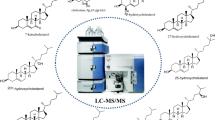Abstract
Oxysterols are oxygenated derivatives of cholesterol formed in the human body or ingested in the diet. By modulating the activity of many proteins (for instance, liver X receptors, oxysterol-binding proteins, some ATP-binding cassette transporters), oxysterols can affect many cellular functions and influence various physiological processes (e.g., cholesterol metabolism, membrane fluidity regulation, intracellular signaling pathways). Due to their crucial role, it is important to be able to quantify them in pathological conditions. The method described here permits to measure the content of oxysterol in plasma, cell, or media using GC-MS.
Access this chapter
Tax calculation will be finalised at checkout
Purchases are for personal use only
Similar content being viewed by others
References
Russell DW (2003) The enzymes, regulation, and genetics of bile acid synthesis. Annu Rev Biochem 72:137–174. https://doi.org/10.1146/annurev.biochem.72.121801.161712
Iuliano L (2011) Pathways of cholesterol oxidation via non-enzymatic mechanisms. Chem Phys Lipids 164(6):457–468. https://doi.org/10.1016/j.chemphyslip.2011.06.006
Bauman DR, Bitmansour AD, McDonald JG, Thompson BM, Liang G, Russell DW (2009) 25-hydroxycholesterol secreted by macrophages in response to toll-like receptor activation suppresses immunoglobulin a production. Proc Natl Acad Sci U S A 106(39):16764–16769. https://doi.org/10.1073/pnas.0909142106
Hannedouche S, Zhang J, Yi T, Shen W, Nguyen D, Pereira JP, Guerini D, Baumgarten BU, Roggo S, Wen B, Knochenmuss R, Noel S, Gessier F, Kelly LM, Vanek M, Laurent S, Preuss I, Miault C, Christen I, Karuna R, Li W, Koo DI, Suply T, Schmedt C, Peters EC, Falchetto R, Katopodis A, Spanka C, Roy MO, Detheux M, Chen YA, Schultz PG, Cho CY, Seuwen K, Cyster JG, Sailer AW (2011) Oxysterols direct immune cell migration via EBI2. Nature 475(7357):524–527. https://doi.org/10.1038/nature10280
Kotti TJ, Ramirez DM, Pfeiffer BE, Huber KM, Russell DW (2006) Brain cholesterol turnover required for geranylgeraniol production and learning in mice. Proc Natl Acad Sci U S A 103(10):3869–3874. https://doi.org/10.1073/pnas.0600316103
Suzuki R, Lee K, Jing E, Biddinger SB, McDonald JG, Montine TJ, Craft S, Kahn CR (2010) Diabetes and insulin in regulation of brain cholesterol metabolism. Cell Metab 12(6):567–579. https://doi.org/10.1016/j.cmet.2010.11.006
Porter FD, Scherrer DE, Lanier MH, Langmade SJ, Molugu V, Gale SE, Olzeski D, Sidhu R, Dietzen DJ, Fu R, Wassif CA, Yanjanin NM, Marso SP, House J, Vite C, Schaffer JE, Ory DS (2010) Cholesterol oxidation products are sensitive and specific blood-based biomarkers for Niemann-pick C1 disease. Sci Transl Med 2(56):56ra81. https://doi.org/10.1126/scitranslmed.3001417
Griffiths WJ, Wang Y, Karu K, Samuel E, McDonnell S, Hornshaw M, Shackleton C (2008) Potential of sterol analysis by liquid chromatography-tandem mass spectrometry for the prenatal diagnosis of Smith-Lemli-Opitz syndrome. Clin Chem 54(8):1317–1324. https://doi.org/10.1373/clinchem.2007.100644
Matysik S, Klunemann HH, Schmitz G (2012) Gas chromatography-tandem mass spectrometry method for the simultaneous determination of oxysterols, plant sterols, and cholesterol precursors. Clin Chem 58(11):1557–1564. https://doi.org/10.1373/clinchem.2012.189605
Saeed A, Floris F, Andersson U, Pikuleva I, Lovgren-Sandblom A, Bjerke M, Paucar M, Wallin A, Svenningsson P, Bjorkhem I (2014) 7alpha-hydroxy-3-oxo-4-cholestenoic acid in cerebrospinal fluid reflects the integrity of the blood-brain barrier. J Lipid Res 55(2):313–318. https://doi.org/10.1194/jlr.P044982
Acknowledgments
This work was in part funded by National Health and Medical Research Council of France (Inserm) and the French National Infrastructure MetaboHUB-ANR-11-INBS-0010.
Author information
Authors and Affiliations
Corresponding author
Editor information
Editors and Affiliations
Rights and permissions
Copyright information
© 2018 Springer Science+Business Media, LLC
About this protocol
Cite this protocol
Riols, F., Bertrand-Michel, J. (2018). Analysis of Oxysterols. In: Giera, M. (eds) Clinical Metabolomics. Methods in Molecular Biology, vol 1730. Humana Press, New York, NY. https://doi.org/10.1007/978-1-4939-7592-1_19
Download citation
DOI: https://doi.org/10.1007/978-1-4939-7592-1_19
Publisher Name: Humana Press, New York, NY
Print ISBN: 978-1-4939-7591-4
Online ISBN: 978-1-4939-7592-1
eBook Packages: Springer Protocols



